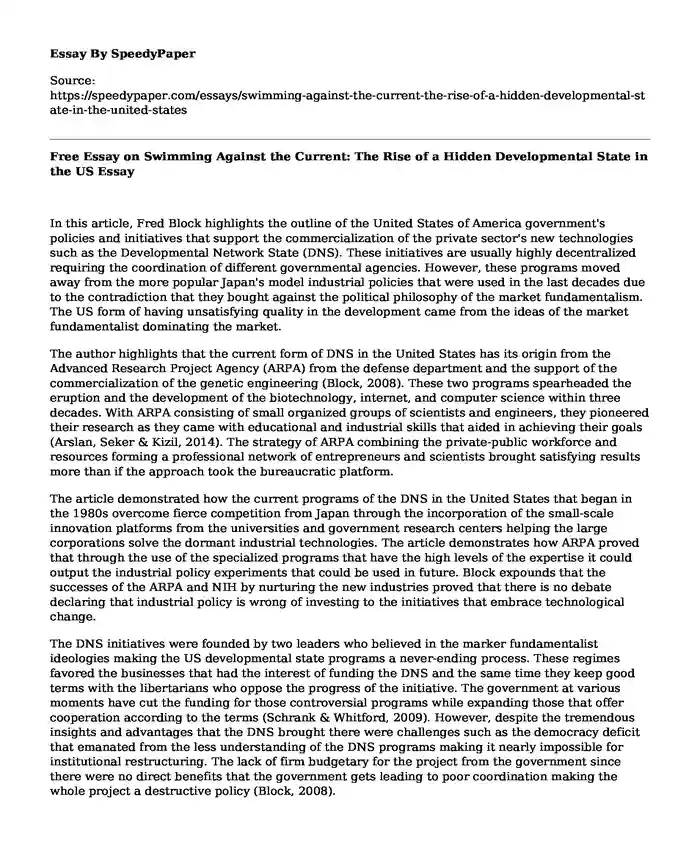
| Type of paper: | Article review |
| Categories: | Policy Technology Government |
| Pages: | 3 |
| Wordcount: | 621 words |
In this article, Fred Block highlights the outline of the United States of America government's policies and initiatives that support the commercialization of the private sector's new technologies such as the Developmental Network State (DNS). These initiatives are usually highly decentralized requiring the coordination of different governmental agencies. However, these programs moved away from the more popular Japan's model industrial policies that were used in the last decades due to the contradiction that they bought against the political philosophy of the market fundamentalism. The US form of having unsatisfying quality in the development came from the ideas of the market fundamentalist dominating the market.
The author highlights that the current form of DNS in the United States has its origin from the Advanced Research Project Agency (ARPA) from the defense department and the support of the commercialization of the genetic engineering (Block, 2008). These two programs spearheaded the eruption and the development of the biotechnology, internet, and computer science within three decades. With ARPA consisting of small organized groups of scientists and engineers, they pioneered their research as they came with educational and industrial skills that aided in achieving their goals (Arslan, Seker & Kizil, 2014). The strategy of ARPA combining the private-public workforce and resources forming a professional network of entrepreneurs and scientists brought satisfying results more than if the approach took the bureaucratic platform.
The article demonstrated how the current programs of the DNS in the United States that began in the 1980s overcome fierce competition from Japan through the incorporation of the small-scale innovation platforms from the universities and government research centers helping the large corporations solve the dormant industrial technologies. The article demonstrates how ARPA proved that through the use of the specialized programs that have the high levels of the expertise it could output the industrial policy experiments that could be used in future. Block expounds that the successes of the ARPA and NIH by nurturing the new industries proved that there is no debate declaring that industrial policy is wrong of investing to the initiatives that embrace technological change.
The DNS initiatives were founded by two leaders who believed in the marker fundamentalist ideologies making the US developmental state programs a never-ending process. These regimes favored the businesses that had the interest of funding the DNS and the same time they keep good terms with the libertarians who oppose the progress of the initiative. The government at various moments have cut the funding for those controversial programs while expanding those that offer cooperation according to the terms (Schrank & Whitford, 2009). However, despite the tremendous insights and advantages that the DNS brought there were challenges such as the democracy deficit that emanated from the less understanding of the DNS programs making it nearly impossible for institutional restructuring. The lack of firm budgetary for the project from the government since there were no direct benefits that the government gets leading to poor coordination making the whole project a destructive policy (Block, 2008).
In conclusion, the existence of DNS has brought both domestic and foreign socio-economic development. In the US the programs have produced the modern innovation economy that is based on the strong partnerships between the government and firms. From the foreign countries perspective, the initiatives have opened the strategies that the other nations can pave their path in technological development.
References
Arslan, M.L., Seker, S.E. and Kizil, C., 2014. Innovation driven emerging technology from two contrary perspectives: A case study of Internet. Emerging Markets Journal, 3(3), p.87.
Block, F., 2008. Swimming against the current: The rise of a hidden developmental state in the United States. Politics & society, 36(2), pp.169-206.Schrank, A. and Whitford, J., 2009. Industrial policy in the United States: A neo-Polanyian interpretation. Politics & Society, 37(4), pp.521-553.
Cite this page
Free Essay on Swimming Against the Current: The Rise of a Hidden Developmental State in the US. (2022, Apr 14). Retrieved from https://speedypaper.com/essays/swimming-against-the-current-the-rise-of-a-hidden-developmental-state-in-the-united-states
Request Removal
If you are the original author of this essay and no longer wish to have it published on the SpeedyPaper website, please click below to request its removal:
- Essay Example on the Richard Cory Poem by Edwin Arlington Robinson
- Cyber Security Essay Sample: Cookies and Privacy, Add Blockers
- Course Petition Essay Example
- Free Essay Example. Nursing Theory
- Essay Sample: Time Travelling For Health Specialist
- Effects of Social Media on our Lives - Essay Example
- Exploring the Interplay of PTSD and Substance Abuse among Military Veterans - Essay Sample
Popular categories




